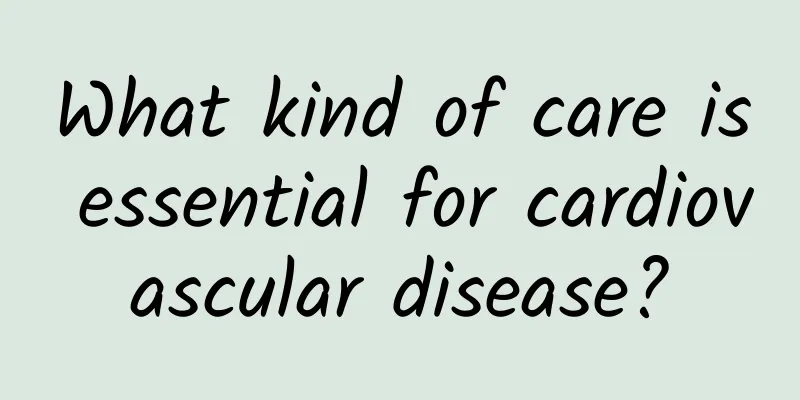What kind of care is essential for cardiovascular disease?

|
Due to the changes in modern lifestyle, the increase in work pressure and the changes in eating habits, the prevalence of cardiovascular diseases is on the rise. According to the statistics of the Ministry of Health in 2007, 40% to 45% of the elderly over 60 years old suffer from high blood pressure and high blood sugar or high blood lipids. According to foreign data, about 50% of diabetic patients have multiple geriatric diseases such as high blood pressure and high blood lipids. Cardiovascular and cerebrovascular diseases have the characteristics of "high incidence, high disability rate, high mortality rate, high recurrence rate and many complications", that is, "four highs and one more". According to statistics, there are more than 270 million patients with cardiovascular and cerebrovascular diseases in my country! Nearly 3 million people die from cardiovascular and cerebrovascular diseases every year, accounting for 51% of the total number of deaths in my country each year. Therefore, we must realize that cardiovascular diseases pose a serious threat to our human health. So how should patients with cardiovascular diseases be cared for? Today, let's take a look! 1. Nursing of arrhythmia Arrhythmia is an abnormality in the heart's beating pattern, rhythm and rate. For patients with heart failure, bed rest is necessary, and attention should be paid to diet, avoiding irritating foods, and not eating excessive amounts. For patients with severe arrhythmia, ECG monitoring should be performed and close observation should be made for dangerous signs of sudden death. If a pacemaker is required, 24-hour ECG monitoring should be performed after pacemaker placement, paying attention to whether the pacing frequency and heart rate are consistent. The patient should remain in a supine or semi-recumbent position in bed for 3 to 5 days, and avoid compressing the placement site. Instruct the patient to limit physical activity within 6 weeks after surgery, have regular checkups, and carry the pacemaker card with them. 2. Nursing of mental exhaustion Pay attention to changes in the patient's symptoms, such as dyspnea, edema, fatigue, cough, etc., and report to the doctor in time. Ensure that the patient takes the medication prescribed by the doctor on time, including diuretics, ACE inhibitors, beta-blockers, etc.; monitor the effects and side effects of the medication in order to adjust the dose or change the medication; supervise the patient's fluid intake and limit salt intake to reduce edema and heart burden; guide the patient to adopt a healthy diet low in salt, low in fat, and high in fiber, and avoid excessive fluid intake. 3. Nursing of hypertension Hypertension is a common clinical disease in elderly patients, which mainly refers to the fact that the pressure of the patient's flowing blood on the blood vessel wall is higher than that of the normal population. Nursing staff will closely observe the patient's condition, paying attention to whether there are symptoms of hypertensive encephalopathy or hypertensive crisis such as a sharp increase in blood pressure, severe headache, dizziness, vomiting, irritability, blurred vision, convulsions, coma, etc.; closely monitor the patient's blood pressure fluctuations and adjust the treatment plan in time; guide the patient to adopt a low-salt, low-fat, high-fiber diet, avoid the intake of high-salt, high-fat foods, and control weight; recommend increasing the intake of fresh fruits, vegetables and whole grains; when the patient's blood pressure is too high, give fast-acting antihypertensive drugs as prescribed by the doctor to lower blood pressure as soon as possible, measure blood pressure regularly and observe changes in the condition. 4. Myocardial disease Myocardial disease is a group of diseases characterized by myocardial lesions, including dilated cardiomyopathy, hypertrophic cardiomyopathy, restrictive cardiomyopathy and other types. The care of patients with myocardial disease should be comprehensively managed according to their specific types and symptoms. For patients with pain symptoms, provide appropriate pain management measures, including bed rest, etc. For patients with fluid retention, monitor fluid intake and urine output, control fluid balance, and avoid edema and heart failure. Give oxygen therapy when necessary, with an oxygen flow of 2~4L/min. Use beta-blockers or calcium channel blockers as prescribed by the doctor to ensure that the patient's oxygenation level is adequate and reduce the occurrence of myocardial hypoxia. The above are the care for several common cardiovascular diseases. So how do patients with cardiovascular diseases take care of themselves in life? 1. Get enough rest If patients with cardiovascular disease feel unwell, they must rest in time. After the pain disappears, they can resume activities moderately. If the symptoms are severe, they must seek medical attention in time. 2. Reduce cholesterol intake Avoid eating foods rich in high cholesterol, such as animal offal, egg yolks, etc. Choose low-cholesterol protein foods, such as chicken, fish and bean products. 3. Control fat intake Reduce your intake of saturated fatty acids, choose vegetable oils instead of animal fats, and limit your intake of high-fat foods such as processed foods and fast food. 4. Increase fiber intake Adequate intake of dietary fiber helps lower cholesterol levels and maintain normal digestive system function. Eat more fiber-rich foods such as vegetables, fruits, whole grains and beans. 5. Limit salt intake Control salt intake, especially for patients with hypertension. Reducing salt intake, eating less pickled vegetables, and avoiding high-salt processed foods are effective ways to lower blood pressure. Salt intake should be controlled below 5 grams per day. For those with high blood pressure or heart failure, 1 to 2 grams of salt per day is appropriate. 6. Live a scientific life and strengthen physical exercise Quit smoking and limit alcohol consumption, avoid excessive stress and fatigue, avoid anxiety and depression, maintain good habits in daily life, strengthen physical exercise, and avoid fat metabolism disorders. In short, the heart is the blood circulation system of the human body. Once it gets sick, it is very likely to endanger life, so correct care is very important. This article proposes several care methods, which only represent personal opinions. If you have any questions, it is recommended to consult a professional doctor. (Cao Ningning, Lingshou County People's Hospital, Shijiazhuang City, Hebei Province) |
<<: Menopause needs to be taken seriously, and sex hormone therapy is the first choice
>>: Pay attention to these in your daily life to stay away from vascular diseases
Recommend
What should girls do if they have heavy hair on their mouths?
Every woman hopes that she will be particularly b...
Why should there be a sense of ritual when celebrating the New Year alone?
Author | Tang Yicheng China Science Popularizatio...
Dark color when menstruation first comes
Normally, women have a menstrual period every mon...
What Chinese medicine should women take for deficiency of Qi and blood?
If a woman's Qi and blood deficiency is sever...
What causes darkening of the vaginal discharge during late menstruation?
Nowadays, many girls will have dark menstrual blo...
Will removing the IUD affect delayed menstruation?
Delayed menstruation is a relatively abnormal sit...
Uterine structure and function
Each organ in the body has its own unique functio...
Why do I always get acne on my chin?
Every female friend will be very annoyed if she g...
Is hcg dilution the same as hcg value?
In clinical tests, in order to determine whether ...
What to do if your blood pressure is low during pregnancy
Many women will experience low blood pressure dur...
Can I eat yellow bone fish during menstruation?
Many people know about menstruation, and many peo...
What color is normal for nipples?
The nipple, also called the teat, is the raised c...
What should women eat to treat freckles?
Women often have spots on their faces that affect...
Children's Day Special | 7 vaccines that children must get
Vaccines are one of the most effective means of p...









